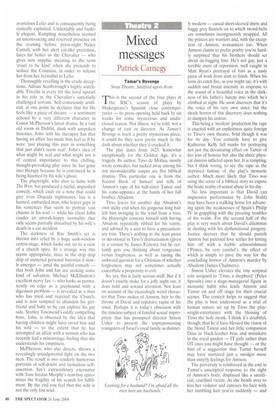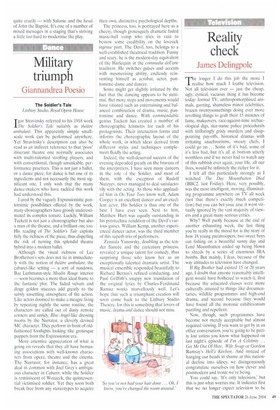Mixed messages
Patrick Camegy
Tamar's Revenge Swan Theatre, Stratford-upon-Avon
This is the second of the four plays in the RSC's season of plays by Shakespeare's Spanish close contemporaries — its press opening held back by six weeks for some mysterious and undisclosed reason. Not illness, we're told; nor a change of cast or director. As Tamar's Revenge is itself a pretty mysterious piece, it could be they were pretty much in the dark about whether they'd cracked it.
The play dates from 1623. Somewhat exceptionally for the Golden Age, it's a tragedy. Its author, Tirso de Molina, mostly wrote comedies, but tucked away among his not inconsiderable output are five biblical dramas. This particular one is from the Second Book of Samuel and tells of Amnon's rape of his half-sister Tamar and his come-uppance at the hands of her full brother, Absalom.
Tirso leaves for another day Absalom's own sticky end when his gorgeous long hair left him swinging in the wind from a tree; the playwright contents himself with having Absalom repeatedly ribbed for his vanity, and advised by a seer to have a precautionary trim. There's nothing in the least pious or devotional in Tirso's dramatisation (given in a version by James Fenton), but he certainly gets you thinking about vengeance versus forgiveness, as well as raising the awkward question for a Christian of whether forgiveness may not sometimes actually exacerbate a propensity to evil.
So, yes, this is fairly serious stuff. But if it doesn't exactly make for a jolly night out, it does hold and reward attention. Not least on account of the exceedingly weird character that Tirso makes of Amnon, heir to the throne of David and repulsive rapist of his sister. Perhaps it is today's obsession with the timeless subject of familial sexual impropriety that has prompted director Simon Usher to present the unprepossessing youngsters of Israel's royal family as distinct
ly modern — casual short-sleeved shirts and baggy grey flannels on to which sword-belts are sometimes incongruously strapped. All the princes are warriors and, with the exception of Amnon, womanisers too. When Amnon claims to prefer poetry you're hardly surprised that his brothers should set about de-bagging him. He's not gay, just a terrible mess of repression, well caught in Matt Ryan's portrayal of him as a nasty piece of work from start to finish. When his loins do catch fire, as you might say, it's with sudden and brutal intensity in response to the sound of a beautiful voice in the darkness of his father's harem into which he's climbed at night. He soon discovers that it's the voice of his very own sister, but the shock horror of this discovery does nothing to dampen his ardour.
This being a 'modern' production the rape is enacted with an explicitness quite foreign to Tirso's own theatre, bold though it was for its day. You certainly have to give Katherine Kelly full marks for portraying not just the devastating effect on Tamar of her loss of honour but also the sheer physical distress inflicted upon her. It is tempting, but I think wrong, to see the rape as the depraved fantasy of the play's monastic author. Much more likely that Tirso was using the cover of a biblical story to expose the brute reality of sexual abuse in his day.
No less important is that David (an impressive performance by John Stahl) may have been a stalking horse for advancing upon the weaknesses of Spain's Philip IV in grappling with the pressing troubles of his realm. For the second half of the play is very much about David's dilemmas in dealing with his dysfunctional progeny. Justice decrees that he should punish Amnon but paternal love settles for letting him off with a feeble admonishment (Prince, be very careful'), the effect of which is simply to pave the way for the concluding horror of Amnon's murder by Absalom (James Chalmers).
Simon Usher elevates the tiny scripted role assigned to `Tirso, a shepherd' (Peter Sproule) into a stage-managerial figure in monastic habit who leads Amnon and Tamar on and off stage for their crucial scenes. The conceit helps to suggest that the play is best understood as a trial of human nature set up by Tirso the playwright-entertainer with the blessing of Tirso the holy monk. I think it's doubtful, though, that he'd have blessed the vision of the blond Tamar and her lithe companion Dina in black-leather bras and miniskirts in the royal garden — IT girls rather than OT ones you might have thought — or the hint of a suggestion that Tamar herself may have nurtured just a smidgin more than sisterly feelings for Amnon.
The perversity is reinforced at the end in Tamar's unscripted response to the sight of Amnon's body, displayed like a sacrificial, crucified victim. As she bends over to kiss her violator and caresses his face with her tumbling hair you're suddenly — and quite crazily — with Salome and the head of John the Baptist. It's one of a number of mixed messages in a staging that's striving a little too hard to modernise the play.



































































 Previous page
Previous page